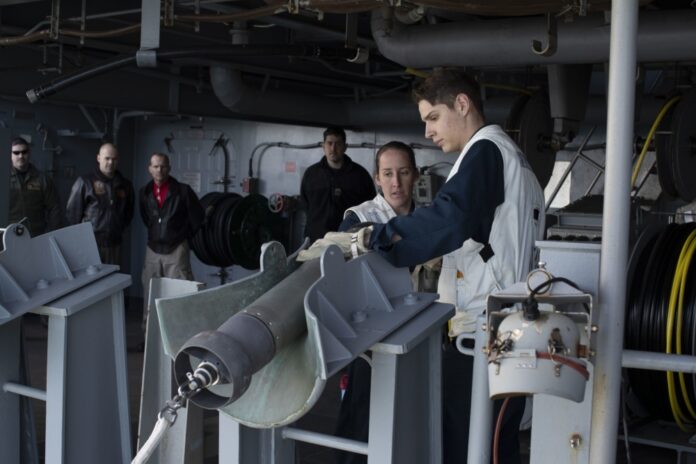Ultra Electronics Ocean Systems, based in Braintree, Massachusetts, has been awarded a $186,411,242 cost-plus-fixed-fee, cost reimbursable, indefinite-delivery/indefinite quantity contract for the AN/SLQ-25E ‘NIXIE’ electro-acoustic towed torpedo countermeasure system, the Ultra Group announced.
This contract includes options which, if exercised, would bring the cumulative value of this contract to $268,514,278. Work will be performed in Braintree, Massachusetts (58%); Manchester, New Hampshire (25%); Lititz, Pennsylvania (13%); and Huntington Beach, California (4%), and is expected to be completed by December 2026. Fiscal 2020 other procurement (Navy) $2,200,000 funding will be obligated at time of award and will not expire at the end of the current fiscal year. This contract was competitively procured via the Federal Business Opportunities website, with two offers received.
“I am delighted that we have been awarded this NIXIE contract which underpins Ultra’s position as a major supplier of towed torpedo countermeasures for the US Navy. We are very proud to be supporting this program which strongly aligns with our vision to innovate today for a safer tomorrow by solving our customers’ most complex, mission critical problems. The efforts put forth by the whole Ultra team have been exemplary, and we are all very much looking forward to getting started on delivering this important program.”
Martin Lewis, President of the Ultra Electronics Ocean Systems commented.
AN/SLQ-25 NIXIE:
The AN/SLQ-25 Nixie and its variants are towed torpedo decoys used on US and allied warships. It consists of a towed decoy device (TB-14A) and a shipboard signal generator. The decoy emits signals to draw a torpedo away from its intended target.
The Nixie attempts to defeat a torpedo’s passive sonar by emitting simulated ship noise, such as propeller and engine noise, which is more attractive than the ship to the torpedo’s sensors.
The AN/SLQ-25A Nixie is a clean-sheet design when compared to the AN/SLQ-25 Nixie. Apart from a few minor mechanical components, they share no common parts. The AN/SLQ-25A utilises a fiber optic tow cable (FOTC) and a 10-horsepower RL-272C double drum winch. Several engineering changes resulted in COTS equipment being utilised extensively in the system. A diagnostic program can be initiated locally or from the remote control station, and tests all electronic functions.
The AN/SLQ-25B includes equipment of the AN/SLQ-25A and incorporates a towed array sensor to detect submarines and incoming torpedoes. The AN/SLQ-25B also incorporates additional active sonar decoys by receiving, amplifying, and returning “pings” from the torpedo, presenting a larger false target to the torpedo.
The AN/SLQ-25C System is an upgrade to the AN/SLQ-25A system. The AN/SLQ-25C incorporates improved surface ship torpedo countermeasures with the addition of new countermeasure modes along a longer, more functional tow cable.




